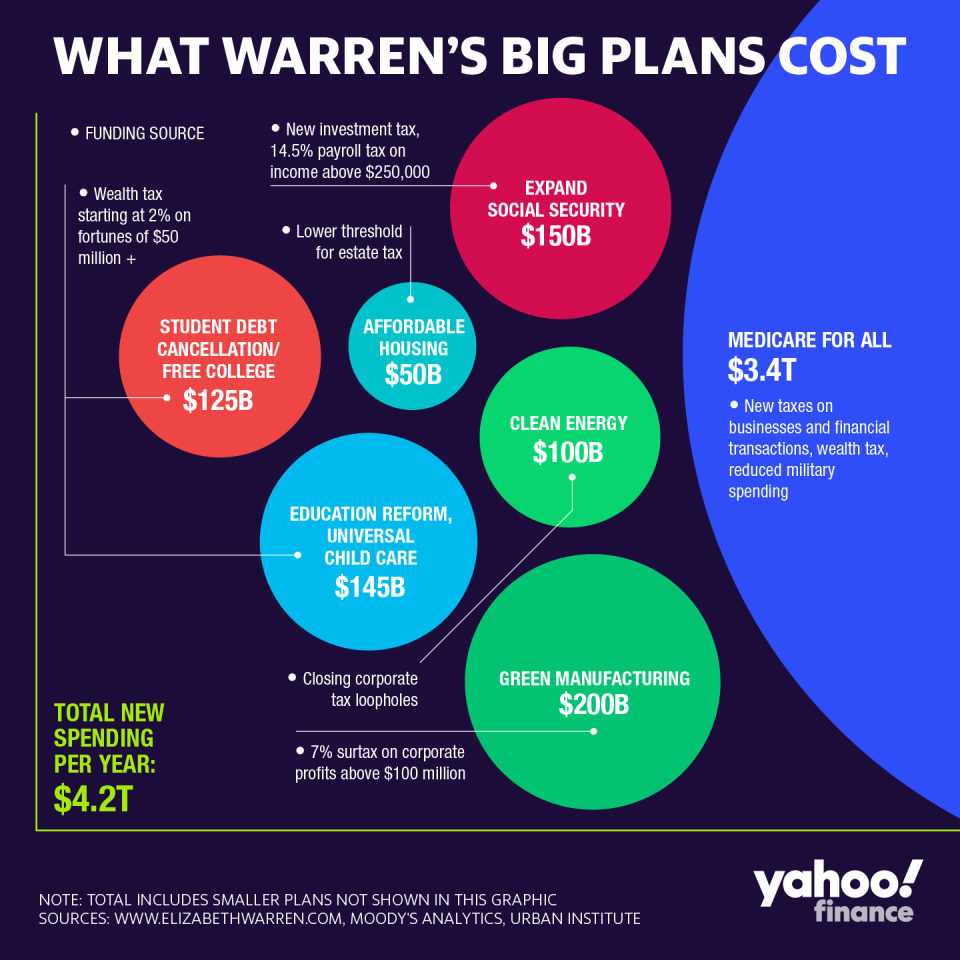The Democrats’ tax plans are too convoluted
Joe Biden and Elizabeth Warren are sparring over a new type of corporate tax. Warren wants big companies to pay a 7% surtax on all profits over $100 million, in addition to whatever tax they’d normally owe. Biden kind of likes that idea, but wouldn’t go quite so far. He’d force firms to pay a 15% tax on all profits above $100 million, but only if they paid zero tax in the traditional system.
Both candidates are addressing the controversy over profitable companies, such as Amazon and Netflix, that manage to slash or eliminate their federal income tax burden through legal deductions and loopholes. Yet neither candidate is addressing the core problem: existing tax breaks passed by Congress in the past that aren’t working as intended. And instead of fixing the problem directly, they’re proposing new layers of taxation likely to be just as prone to abuse as the problematic laws they’re supposed to fix.
Taxes are Topic A among Democrats running for president, because they’re needed to pay for all those plans to reform health care, education, climate policy and many other things. But the Democrats are overplaying their hand. Voters favor some new taxes and don’t mind if businesses and the wealthy pay more. But few voters are tax experts, and they tune out complicated ideas they don’t understand. Democrats should start with simpler, intuitive tax hikes instead of overcomplicated new ideas. Four examples:
The wealth tax. Elizabeth Warren and Bernie Sanders want to tax the wealth of multimillionaires, in addition to their income. The idea is to get a large annual revenue stream from people who earn much of their income from investments, rather than work, and who pay relatively little in income tax. Problem: Illiquid assets like private businesses, real estate and art are hard to value. Taxing wealth will likely send much of it overseas. And a wealth tax may be unconstitutional, which is sure to lead to legal battles if it ever passed into law. To understand why, voters would need to bone up “apportionment” requirement in the Constitution. If Warren held a televised seminar, would you watch?
A simpler approach might be raising capital gains taxes, which are already a kind of wealth tax—with no constitutionality problems. Warren says she prefers a wealth tax because of all the ways rich people with armies of tax lawyers skirt capital gains taxes. Yet those same lawyers would find all the holes in a wealth tax. Plus, it would probably be easier, politically, to tighten up an existing tax than to impose an entirely new one.

The secondary corporate tax. Warren calls her version of this the “real corporate profits tax,” while Biden calls his a “minimum book tax.” As described above, both are supposed to prevent companies from evading taxation because of legal loopholes in the tax code. That raises an obvious question: Why not just plug the loopholes, instead of leaving the loopholes in place and passing another new tax to counteract them? Again, the idea is that these alternative business taxes would be more impervious to lobbying meant to eviscerate them. Yet it’s the same Congress that would have to pass the new tax or repeal the old loopholes. Seems like a shell game.
By the way, the tax loopholes Warren and Biden and trying to subvert are there because at some point in the past, Congress thought they’d incentivize corporate investment, hiring and other things that would be good for the economy. If those tax breaks aren’t working as intended, the place to start is by repealing them. But it’s silly to have one set of tax policies meant to do one thing and another set of tax policies to prevent the first set from working.
New payroll taxes. These are taxes paid equally by employers and their workers to fund Social Security and Medicare. Elizabeth Warren wants to impose a new 14.8% tax on incomes above $250,000, borne half-and-half by company and employee, to fund richer Social Security benefits and stabilize the program’s finances. There’s currently a cap on the amount of income subject to this tax, which is $132,900. But that adjusts upward every year, to account for inflation. So under Warren’s plan, the gap between the existing cap and her new $250,000 threshold would shrink over time, until everybody was subject to her new 14.8% tax. Get it? Not sure I do, either.

This contortion exists so Warren can say she’s not raising middle-class taxes one penny. (If you earn $250,000, you’re wealthy, not middle class, see?) But it’s just too complicated and it’s one reason voters are suspicious of politicians who tell them, “don’t worry, I’m raising somebody else’s taxes, not yours.” Eventually, you are the somebody else paying those new taxes.
All the Democratic tax hikes combined. Joe Biden, supposedly the most moderate Democrat, backs at least 10 new tax hikes. Warren’s various plans would require around $4.2 trillion in new taxes or other funding sources—more than double the current level of federal taxation. Pete Buttigieg has been more evasive, providing just vague details about how he’d fund his proposals, which are similar to Biden’s. And Bernie Sanders wants to tax the wealthy so much that their net assets would probably decline over time—what’s known as a “confiscatory” tax. All told, there are probably some voters tuning in with one ear who feel like all they ever hear Democrats talk about is new taxes.
If the Dems were to Keep It Simple, Stupid, they could make a plausible case for modestly raising business taxes, restoring the top income tax rate to 39.6% (where it was before the 2017 Trump tax cuts), taxing capital gains more like income and raising the estate tax. Kill a few extravagant loopholes in the bargain—and explain what worthy cause you’d spend the new funds on. No need to be any more clever than that.
Rick Newman is the author of four books, including “Rebounders: How Winners Pivot from Setback to Success.” Follow him on Twitter: @rickjnewman. Confidential tip line: rickjnewman@yahoo.com. Encrypted communication available. Click here to get Rick’s stories by email.
Read more:
Read the latest financial and business news from Yahoo Finance
Follow Yahoo Finance on Twitter, Facebook, Instagram, Flipboard, SmartNews, LinkedIn, YouTube, and reddit.

